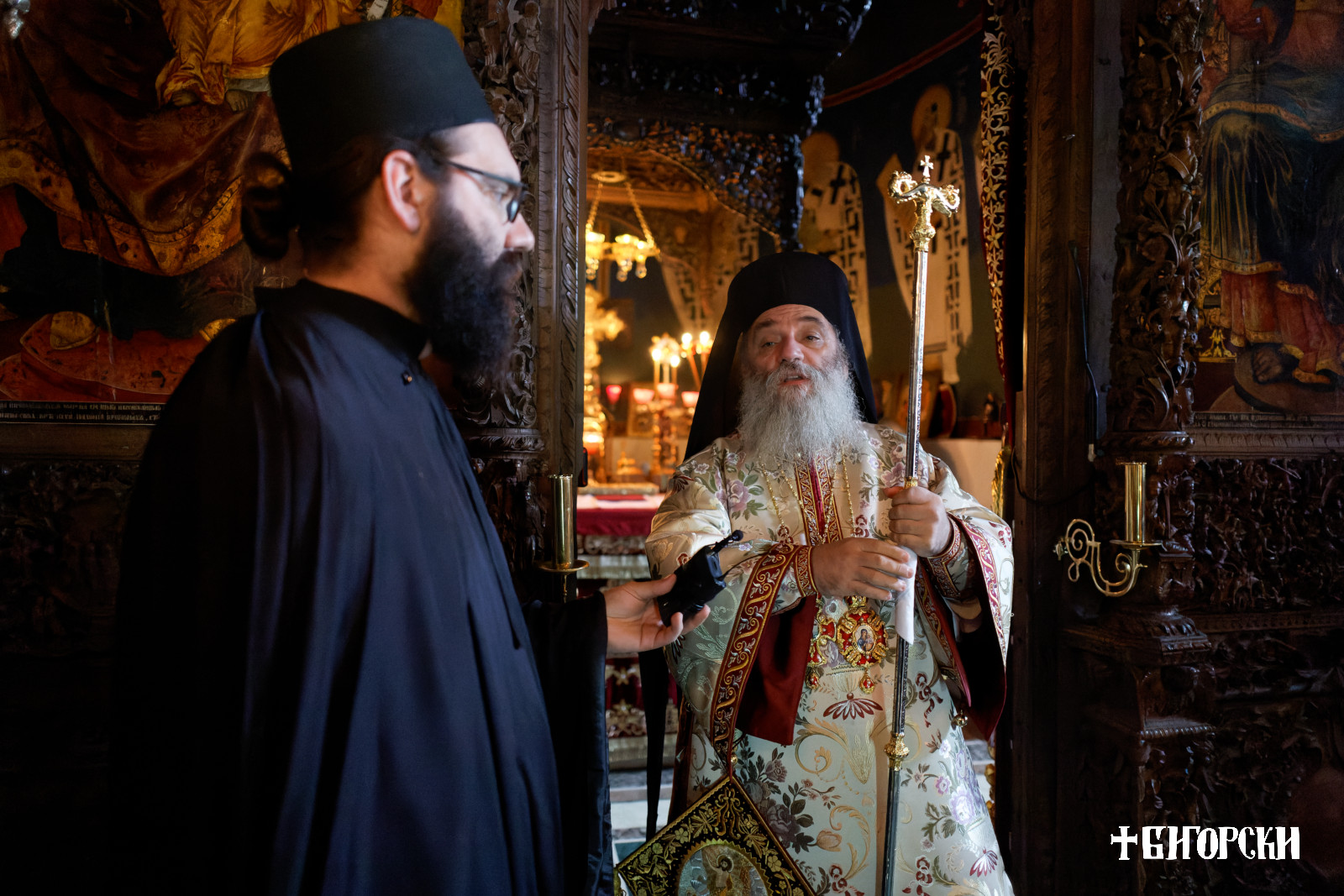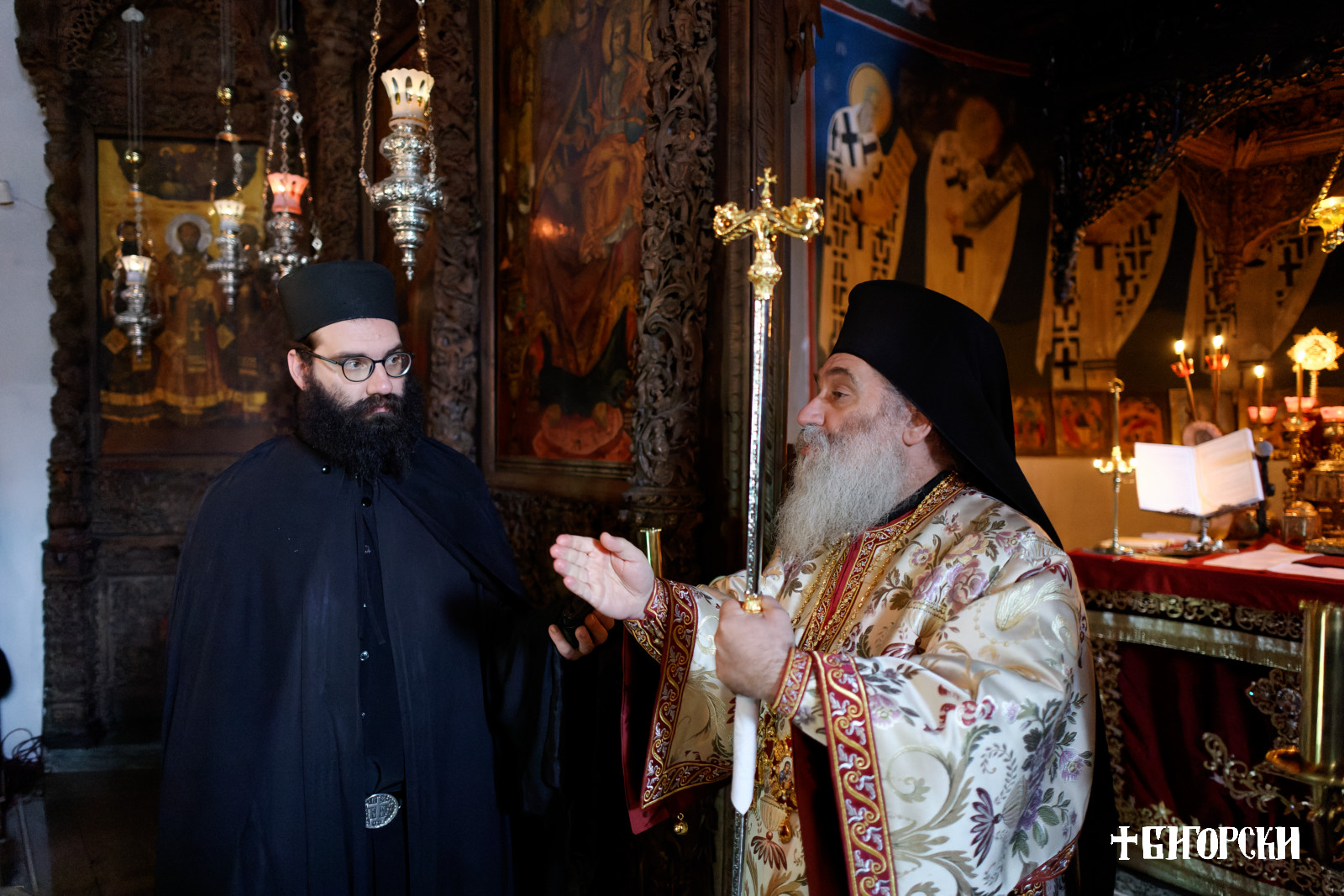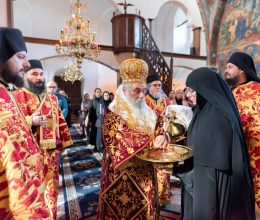Sermon of His Grace, Bishop Partenij of Antania, Abbot of the Sacred Bigorski Monastery, Delivered on the Sunday of the Man Born Blind, during the Divine Liturgy following the Gospel reading, on May 21, 2023
In the name of the Father, and of the Son, and of the Holy Spirit!
My beloved, in today’s sacred Gospel reading, we heard about the great miracle our Savior, the Lord Jesus Christ, performed on the man born blind in Jerusalem (John 9:1–38). This man was born with a serious handicap—he had no eyes from birth. Because of this, he was well-known among the residents of the city and its surroundings, as many were familiar with him and his condition. We can infer this from the dialogue between the apostles and Christ, who, upon seeing the blind man as they passed by, asked their Teacher: “Rabbi, who sinned, this man or his parents, that he was born blind?” To this, Christ replied: “Neither this man nor his parents sinned, but that the works of God might be revealed in him.”
Indeed, Christ had compassion on the man, and with His own saliva, He made clay from the earth, anointed the man’s empty eye sockets with it, and sent him to wash in the Pool of Siloam. When the man did as he was told, a wondrous miracle occurred: the clay transformed into living eyes, and for the first time in his life, he could see.
It is noteworthy that the Lord chose to create the man’s eyes from clay, even though He could have done it with just a word or a thought. He chose this method to show that He is the One who, in the beginning, created man from the dust of the earth and breathed into him the breath of life; that He is the One described in the Book of Genesis, the Creator not only of the visible world but also of the invisible.
The healing of the man born blind caused a great stir in Jerusalem. Never before had anyone heard of someone making a man blind from birth see. Many even questioned whether it was truly the same person. As the Gospel says, “The neighbors and those who had seen him before as a beggar said, ‘Is this not he who used to sit and beg?’ Some said, ‘It is he.’ Others said, ‘No, but he is like him.’ But he kept saying, ‘I am he.’”
The beauty of this event lies not only in the man’s physical healing but, more importantly, in his spiritual enlightenment. He not only saw the physical light of the world for the first time but also the true spiritual Sun—Christ God. In Christ, he recognized the Son of God and worshiped Him. He had received both the gift of sight and, even more importantly, the gift of faith, for he saw the One who declared to His disciples: “I am the Light of the World.”

This spiritual vision is far more significant than mere physical sight. As we heard in the Gospel, news of the healing spread quickly throughout the city, disturbing the high priests and the leaders of Israel. These spiritually blind leaders were filled with even greater envy toward Christ. They panicked at the thought that He, the one who performed such miracles, might eclipse their glory or even take their positions of power.
These people were not uneducated; on the contrary, they knew the Scriptures well and were aware that the Messiah would come. However, their hearts were hardened, and they were spiritually blind, holding false and misguided expectations of the Savior—expectations far removed from what He truly came to be. They imagined the Messiah as a powerful political leader who would bring not spiritual salvation but worldly freedom—freedom meant exclusively for the people of Israel, with special privileges reserved for them as a righteous elite.
Blinded by such misconceptions, they could not comprehend God’s plan for the salvation of all nations. In their narrow ethnocentrism, they believed that God would liberate only Israel and that their nation would rule over all others. If I may use modern terms, they were a kind of narrow-minded nationalists, unable to grasp the divine purpose of uniting all humanity into one brotherhood—a mission that is the very essence of the New Testament Church.
Driven by fear that Christ, whom they saw as their rival, would take away their glory and their privileged positions in the Temple, they rushed to stop Him, accusing Him of wrongdoing. Their envy and hatred toward Him are vividly illustrated in their conversation with the man who had been healed. They demanded: “Give glory to God! We know that this Man is a sinner!” They tried to force the healed man to blaspheme against his Benefactor—the One who had brought him from darkness into light.
These men were so blinded by envy that they were even willing to kill Christ. Envy is a terrifying passion—it is a force that destroys. There is nothing more dangerous than such spiritual blindness, when a person becomes entirely consumed by jealousy and hatred. In fact, the first murder in human history was committed out of envy: Cain killed his brother Abel because he envied the favor Abel found with God. Joseph’s brothers sold him into slavery out of envy, for their father Jacob loved him most as the youngest son.
There are countless other examples in Scripture, as well as in our personal lives, that demonstrate the destructive power of envy. May God protect us from such terrible spiritual blindness!

Beloved, from the very beginning after the Fall, and even to this day, people remain the same—much like those in the time of Christ. Some receive spiritual sight, while others remain blind and hardened, killing every good thing in others, and by doing so, killing God within themselves. Through this, they destroy both themselves and their neighbors. Often, envy disguises itself as righteousness. Unfortunately, even Christians today are not immune to this phenomenon. And for those within the Church, this tendency is particularly dangerous. Both among the clergy and the laity, there are people who, on the one hand, read the Gospel, and on the other, judge and spiritually harm their neighbor. And in the name of what? In the name of rules, canons, and the like.
In today’s Gospel, we heard that the Pharisees accused Christ of breaking the Law of Moses because He made clay on the Sabbath to heal the man born blind. What had Christ done on the Sabbath? A work of love. And yet, these spiritually blind men took issue with the fact that He performed an act of love on that day. Imagine! He healed the eyes of a man who had never once seen the sun, who had never known what his loved ones looked like, or what the world around him was like—and these men chastised Him by invoking the canons of the Mosaic Law! I believe that all of you can recognize this same attitude in our time. Even today, there are priests and laypeople who act in this way. A quick glance at social media is enough. People boast of being Christians, yet their only actions are to write and judge others—citing rules and canons as justification for condemning everyone.
They act as though they know everything, interpreting canons, deposing bishops, priests, and monks with harsh and inappropriate words. They even declare that certain hierarchs are heretics, that priests are unworthy, and that those living in monasteries are not fit for their calling. They judge those who have left everything behind to enter the monastery and serve Christ—precisely at a time when the world is in desperate need of Christ’s message of mercy and love, and when neo-paganism is spreading everywhere.
What people need today is understanding, openness, forgiveness, compassion, and love—they need Christ. Christ’s mercy is especially needed by those who, in their inner struggles, fall into sin and rebellion, mistakenly believing they will find truth there. And what do we, who are in the Church, do? We judge them. Even though we ourselves fail to live according to the commandments, some do not hesitate to condemn others, refusing to provide a good example through their own lives. They enter the Church but shut its doors to others. And those outside the Church, seeing what happens within, may say: “If those who go to church do not become better but grow even worse and more judgmental, why should we go there at all?”
There is no worse condition than being in the Church, near Christ—the source of all that is beautiful and noble—yet remaining spiritually blind. Instead of becoming a better person, one nurtures passions. Instead of putting on Christ in baptism and living with and in Him, one acts according to the old self—or even worse.
Beloved, our task is to be true Christians, faithful believers. We will become such only if we love the Lord with all our being and our neighbor as ourselves. On these two commandments, which were already given in the Old Testament, Christ builds the entire Law. The commandments of love, therefore, are placed above the Law and the prophets. For whoever loves does not sin. True love—the divine love that comes from God—goes to the point of self-sacrifice for others.
Some of those who are quick to judge even take issue with spiritual teachers who speak of love. But what else should they speak of when God is love?
Today, we also celebrate Saint John the Theologian, known as the Apostle of Love. We heard the Gospel reading appointed for his feast, recounting how he remained with Christ even in His most difficult moments—there at Golgotha, under the Cross, together with the Mother of God and the Myrrh-bearing women. He was the only one of the apostles who stayed with Christ during those most harrowing moments. In his Gospel, Saint John refers to himself as “the disciple whom Jesus loved” (John 19:26). Does that mean that the Lord did not love the others? Of course not—He loves all of us equally. But Saint John loved the Lord in a special way, returning Christ’s love with a fullness unmatched by the others. Out of humility, he does not say that he loved the Lord, but rather that the Lord loved him.
It was precisely this love for God that made Saint John the beloved disciple of Christ and earned him the title of the first Theologian. It was out of love that, at the Last Supper, he leaned on the chest of the Lord, drawing divine wisdom from Him. His Gospel is written in the most exalted style, filled with divine mysteries revealed by the Holy Spirit. And it was he who was the first to run to the empty tomb after the Resurrection.
Therefore, beloved, let us ask this great Apostle, who became the greatest theologian through his love for God, to teach us to love Christ more, so that we too may become His true followers. Only then will we be able to become light ourselves, as He is light, and as He commanded us to be.
Let us be light, and let that light shine for all those who are in desperate need of it. Amen.
Christ is risen!















